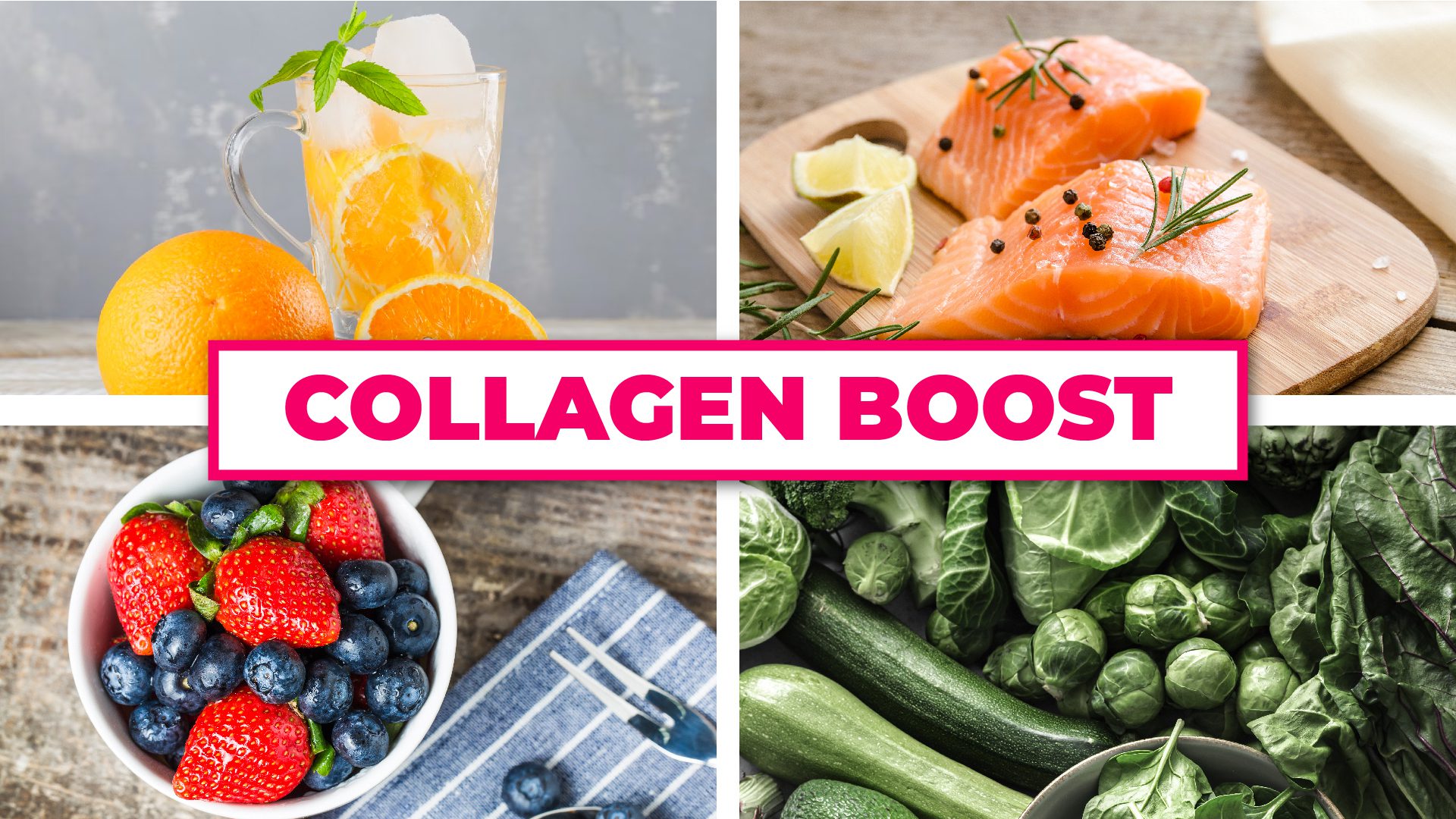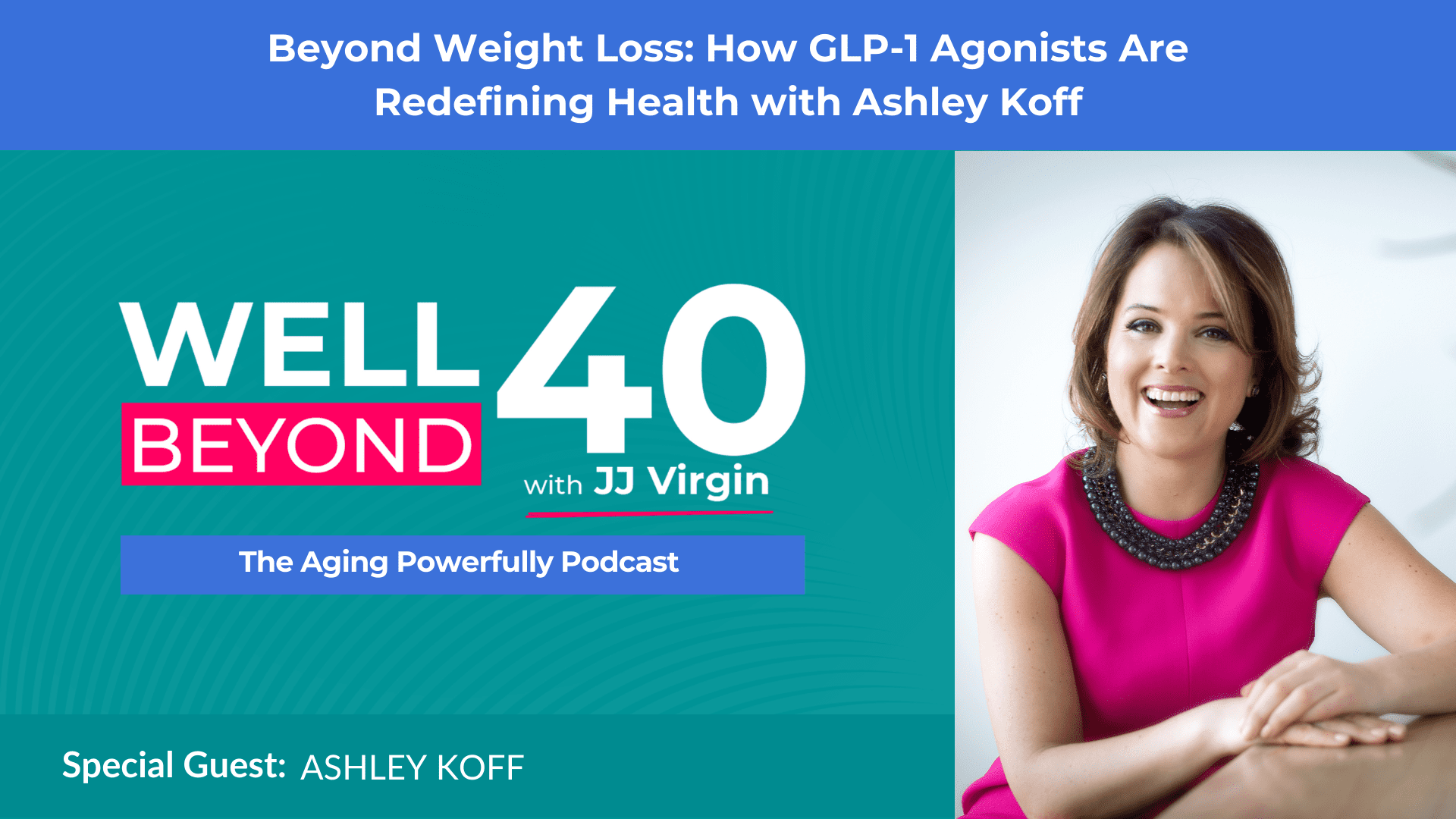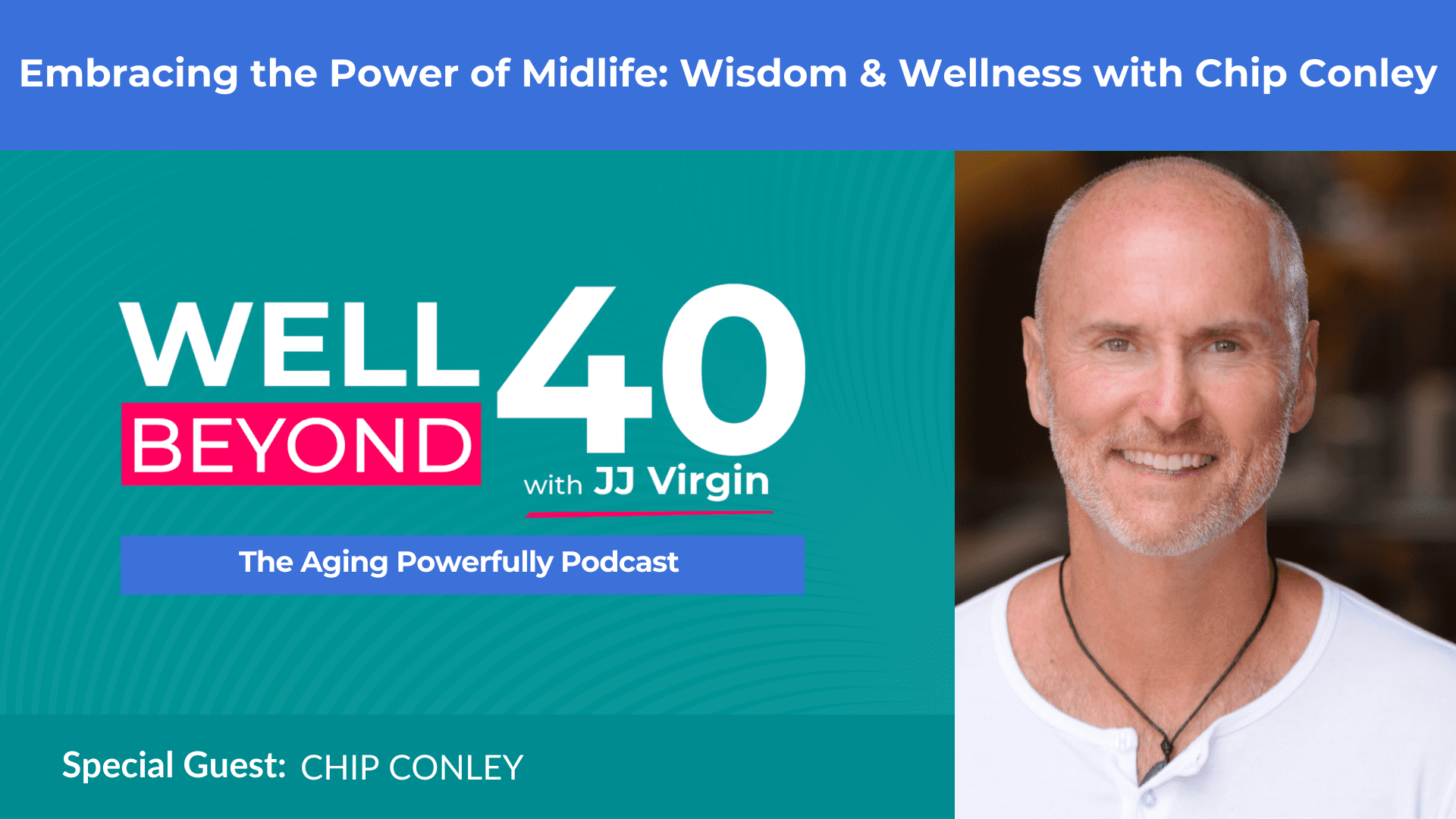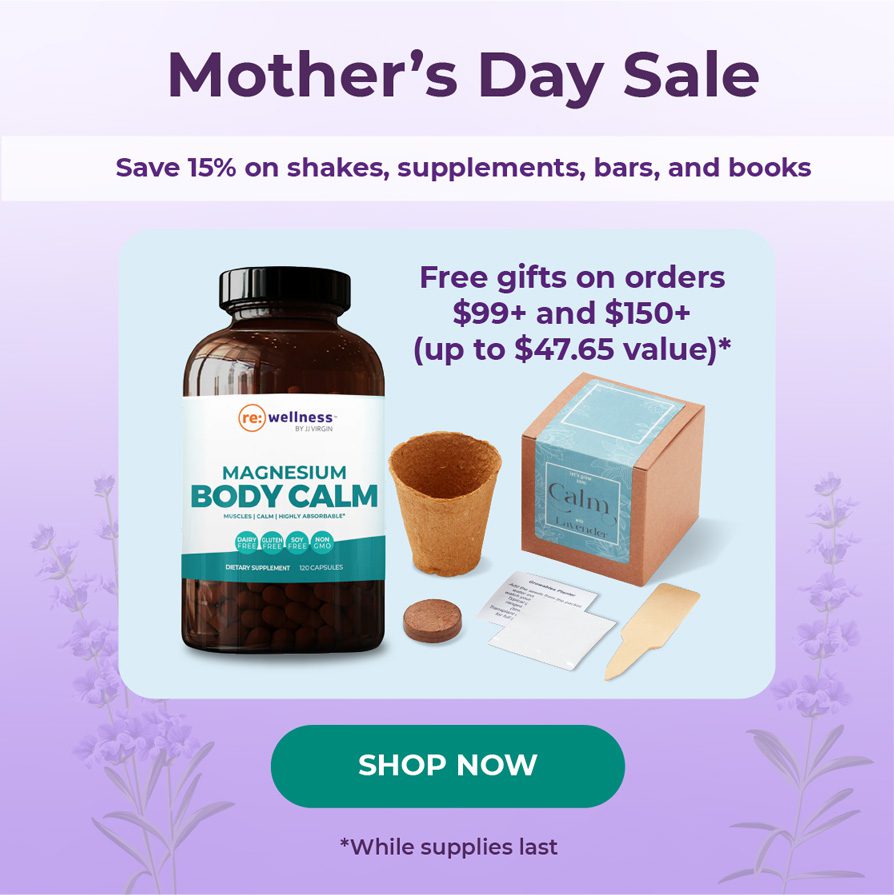Outsmart Aging and Get Glowing
As you get older, not only does your collagen production decline, but—double whammy—so does its integrity. Collagen is the most abundant protein in the body, and, of course, a primary component of gorgeous, glowing skin.
Today on the podcast, I’m doing a quick and thorough examination of collagen. You’re going to learn about what it is, the surprising reasons it matters, and what breaks it down.
Then, of course, I’m telling you exactly what you should and shouldn’t be eating right now to support your body’s natural collagen production. I’m sharing the seven best foods for it, and the absolute worst one.
In just 20 minutes, you’ll walk away empowered to eat your way to clear, firm, and beautiful skin.
Timestamps
00:01:22 – What is collagen and why is it important for your health?
00:02:59 – How your body makes collagen
00:04:27 – Food sources for collagen-promoting nutrients
00:07:13 – Three crucial amino acids
00:09:21 – What to do if you’re intolerant to this superfood
00:11:35 – Supplement with this for skin and muscle health
00:12:07 – Is there such a thing as vegan collagen?
00:13:30 – How dehydration leaves you susceptible to problems
00:14:32 – What not to eat
00:16:37 – The problem with omega-6s
00:18:52 – Does it matter when you eat?
Resources Mentioned in this episode
Watch the FULL VIDEO on my YouTube Channel
Read my book, Sugar Impact Diet
Learn how foods cause leaky gut in The Virgin Diet
Reignite Wellness ™ Sparkling C Powder
Get my Eat Protein First Smoothie Cookbook
Designs for Health Amino Acid Synergy
Reignite Wellness ™ Paleo-Inspired All-in-One Shakes
Reignite Wellness ™ Omega Plus
ButcherBox grass-fed & grass-finished beef
Vital Choice Wild-Caught Seafood, Fish, and Salmon
Reignite Wellness ™ Collagen Peptides Powder
Video: For Great Skin – Here's What To Eat, When & Why!
ATHE_Transcript_Ep 584_7 Collagen Boosting Foods to Eat for Younger Looking Skin
JJ Virgin: [00:00:00] I'm JJ Virgin, PhD dropout, sorry mom, turned four time New York Times best selling author. Yes, I'm a certified nutrition specialist, fitness hall of famer, and I speak at health conferences and trainings around the globe, but I'm driven by my insatiable curiosity and love of science to keep asking questions, digging for answers, and sharing the information I uncover with as many people as I can.
And that's why I created the Well Beyond 40 podcast. To synthesize and simplify the science of health into actionable strategies to help you thrive. In each episode, we'll talk about what's working in the world of wellness, from personalized nutrition and healing your metabolism to healthy aging and prescriptive fitness.
Join me on the journey to better health so you can love how you look and feel right now and have the energy to play full out.[00:01:00]
Want to look younger than your age? I know. That's a ridiculous question. I mean, who doesn't? Now, you can buy all the expensive eye creams and serums you want. I know I do, but you know what's really going to make a big difference in your skin's youthfulness and glow? It's really what's at the end of your fork, and I'm going to share the best foods that you should eat to boost collagen for younger looking skin.
But first, let's talk about what it is exactly and why it's so important for your health. So collagen, it is the most abundant protein in the body. It's accounting for about one third of the total protein in our bodies. It provides the structure and support to our skin, to our bones, to our tendons, our ligaments, our joint, and our cartilage.
And it's important because it provides tissues with both strength and elasticity, and it helps maintain the structure of skin. It keeps it firm. It keeps it supple. It helps prevent wrinkles and fine lines. It's really important for your hair and nails. It's important for follicle support [00:02:00] and hair growth and nail strength and growth and renewal.
And for your bones, collagen gives them the strength and resilience and it helps prevent fractures and breaks. It helps support bone density and helps support bone growth. And it also is super important for your tendons and your ligaments and your joints for that strength and the flexibility and stability.
But it's not just that. It's also super important for your gut health. It helps strengthen and repair the lining of your digestive tract, which it's a major component of this connective tissue, and it helps maintain the lining. And if you've heard me talk about leaky gut and food intolerance, and you always hear me talk about collagen and using bone broth protein, that is why it really is super important for gut healing.
And speaking of healing, It's also important in the healing process of any kinds of wounds and injuries. So that's what it is and that's why it's important. So now let's talk about how it's made. So [00:03:00] your body makes collagen by using special cells called fibroblasts. And these are found in your skin and your muscle and other tissues.
So fibroblasts make the individual building blocks of collagen. Which are called collagen peptides. These peptides are then put together to form long, thin fibers called collagen fibrils, which give your tissues their strength and their structure. Now here's the deal. As you get older, not only does your collagen production decline, but also double whammy, so does its integrity.
The distribution of collagen becomes more fragmented, which means no surprise. Visible signs of aging, things like sagging and dry skin and wrinkles. On top of this natural decline, collagen loss can also come from prolonged sun exposure. This can damage the collagen fibers from smoking, from environmental pollutants.
These can also cause collagen breakdown and then hormonal changes that occur with aging like lower estrogen. You probably noticed [00:04:00] estrogen started to drop and all of a sudden you're like, what's up with my skin? That's the collagen. And of course, food. The food you eat has a big impact. And if you're not getting all the right nutrition in your diet, you're going to see it in the mirror.
That's actually great news when you think about it because a really good diet, which we're going to talk about, is going to give you the right nutrients that support natural collagen production in the body, especially as you age. So I'm going to give you the most important ones that you can be eating, right?
So they're going to give you all the critical nutrients and then which foods you can get them from. And I'm going to start with the key biggie biggie, and that is vitamin C. So vitamin C helps enzymes in our body convert amino acids into the building blocks of collagen. This one gets depleted. With stress, like who isn't stressed out?
So this is a super important one because if you're under any kind of stress, you're probably going to want to supplement beyond just food. I know I do. I [00:05:00] take extra vitamin C every single day. And if I'm under more stress or. If you like something, I might be getting a little sick, I crank it up past that.
But let's talk of where you can get vitamin C in foods. So obviously things like citrus fruits, right? The oranges, grapefruits, lemons are rich in vitamin C. And again, vitamin C is critical for collagen synthesis. And one of the things that I like to do is I'll use this product called Suja Lemon Love.
It's lemon juice with stevia and a little cayenne, so a little metabolic boost. So that's another great one. And a great hack is lemon juice before a meal lowers the blood sugar response to a meal too. So double whammy. That's the first one. Now you may not have thought of berries, but strawberries and blueberries and raspberries and kiwis, these are great too.
So this is another great way to get them in. And I like you to have two fruit servings every single day. And what I would say is. Just really work on making sure one of those is berries. Super important. And those, of course, are easy to keep in the freezer and throw into your loaded protein smoothie. Now, another one are bell peppers.
I [00:06:00] personally hate bell peppers, except for the red ones, which is great news because… The red ones are the best sources of vitamin C. They actually contain more vitamin C than oranges. And this is just one of those things that's so easy to have around and throw into a stir fry, add to a salad, right? So high shout out for red bell peppers.
Next one are dark leafy greens. And, you know, this could be you smuggling in some deep green leafies, like some kale, into your smoothie so you don't have to taste it. Arugula salads. So deep green leafies are great. And really, since we want you to eat at least five servings of non starchy vegetables a day, more is better, more is better, more is better.
Then, make at least two of those servings, maybe three, of deep green leafies. I keep a variety of them in my fridge and I have a big salad every single day with a little extra virgin olive oil. So that's an easy way to do that. And then, tomatoes. Tomatoes are really important because not [00:07:00] only do they have the vitamin C, they also contain lycopene.
And lycopene is important because it prevents the breakdown of collagen in your skin. What does that mean? That keeps your skin plumper longer, which we want. Next up, we need amino acids every single day. We do not have anywhere to store them. Super important. Specifically here, I'm talking about three amino acids, glycine proline and hydroxyproline.
And then of course, just protein overall. But those amino acids make up collagen. So we want to make sure that we're eating amino acid rich foods. One of the simple ones is to use our protein powder. So I do my paleo inspired protein powder, but of course, things like grass fed beef, pastured poultry, wild fish, and then If you are not intolerant, pastured eggs and grass fed dairy.
But again, if you're not intolerant. And big shout out to our Paleo inspired all in one shake. And here's [00:08:00] why. It's made from bone broth protein. So it's over 97% protein and it's got a very high protein usability score. This measures how well your body's able to use the protein. Super important. Really good absorption levels.
But also it's got some really good collagen in there as well. So shout out for that one. That's one that I use every single day. I also add in, and we'll talk about this in a moment, some extra collagen. Okay. Next up, some minerals, zinc and copper. Now zinc is important because it helps us make the enzymes needed to break down old collagen fibers so new ones can be made and then copper.
Helps us make an enzyme that links collagen fibers together, which is what gives our skin, our bones, and our other tissues strength. So where are we going to get our copper and zinc? Well, I take a daily packet of mine and I'm getting my copper and zinc there, but also you want to get, remember, food first and then supplement.
So grass fed beef, shellfish, nuts, deep green leafies are all [00:09:00] great places here to get those as well. Next up is vitamin A. And vitamin A is important because it can help protect collagen from breaking down and it helps support formation of new collagen fibers in the body. And you can find this in leafy greens and broccoli and bell peppers and sweet potatoes and carrots and mangoes and apricots.
And if you're not intolerant, pastured eggs are a superfood. But again, what I found when I was doing the virgin diet is as I was running a lot of food sensitivity tests, I found so many people intolerant to eggs and dairy. Which is a sign that they need to improve their gut, which remember collagen helps improve your gut.
So you kind of see the circle that we're going around. Heal your gut. Potentially you can eat that pastured egg at Grass Fed Dairy, but eggs are so great here, and again, you'll get great omega 3s in the yolks. They're super important. Next one, big shout out for omega 3s and omega 3s are important here because they are anti inflammatory and inflammation is.
Havoc for your skin. [00:10:00] Inflammation can damage the collagen fibers and prevent your body from creating new ones. Now, omega 3s are important because not only are they anti inflammatory, they can also improve hydration, which of course is important for keeping your skin healthy and elastic. So where are we getting those omega 3s?
Grass fed beef. And by the way, really, whenever I say grass fed, it should be grass fed and grass finished. Because really, all beef is grass fed. It's how it's finished. So grass fed is always. Coupled with grass finish, you're going to get the omega 3s there. Of course, fatty fish, tuna, halibut, sardines, and then walnuts and chia and flax and hemp.
I'll tell you though, these omega 3s are great to get the real DHA and EPA. You're going to get that from the fish or from supplementation. And I think we all should be supplementing with a good omega 3 supplement. I use Omega Plus. I take it every day. It's an EPA, DHA, clean fish oil supplement. The other thing that I supplement with [00:11:00] every day is collagen.
I take supplemental collagen. Now, Your body breaks down protein into amino acids, right? And those amino acids are then used to create new proteins in the body, including collagen. So one review published in the International Journal of Dermatology looked at 19 studies of over 1, 100 women taking hydrolyzed collagen supplements for 90 days.
And they found plenty of great skin benefits compared with the placebo. So they found that collagen supplementation reduces wrinkles and improves skin elasticity and hydration. So that's enough for me. There's actually a lot of really great research out on taking supplemental collagen, not just for skin, but also for muscle health.
So, what I do is I have my collagen peptide powder. I literally travel with this, too, because this helps me up the protein when I might have challenges while I'm out. I can add it to my coffee. I throw it into my smoothie every morning. It's tasteless, so you can literally put it into sauces and soups and dressing.
Super [00:12:00] easy, and it blends easy, too, so it's easy to do. And I just gotta give you a shout out on this, because I've seen this around, and it makes me a little nuts. There isn't a vegan collagen, like it can't exist because collagen is an animal derived protein. So you'll see these supplements going, vegan collagen, it's not.
They might contain products, nutrients that help support collagen production, but you aren't getting the amino acids that you would need, that you would get if you were either using bovine or marine derived collagen source, okay? Now, if you're vegan, one of the things that could help you here, Is using sparkling sea powder.
That's my vitamin C because C is super important for making collagen. Now, the other key important one is hydration. And we talk a lot about hydration because in terms of metabolism and body composition, Being well hydrated is super important, but also for healthy skin, it is too because collagen is primarily made of water and you need adequate hydration to maintain [00:13:00] fluid balance in your cells.
In addition to water, collagen synthesis requires the presence of specific amino acids and other nutrients, many of which are transported through the body in water based fluids like blood and lymph. So if you don't have adequate hydration, The body may not be able to deliver these nutrients to the cells responsible for collagen synthesis.
So when the body is well hydrated, it can help maintain the integrity and structure of collagen proteins in the body. Now, when your tissues become dehydrated, they become weak, they become brittle, they become more prone to damage. For example, think of your skin. Dry skin is more susceptible to wrinkles.
Dehydrated cartilage can lead to joint pain, stiffness, and injury. You gotta make sure you're getting in adequate water. So how much is this? And really, let's say optimal water. So what you want to do is you want to drink at least half your body weight in ounces. That's the starting point to drinking enough water so that you help keep the skin and other tissues [00:14:00] hydrated, right?
Because that's going to really help maintain that structural integrity and resilience. But that's just a starting point, right? Because if you were exercising, let's say that you're living in a human place or a hot place, then you're going to want to drink some more as well. And one of the tests that you can do is the pee test.
So look at your urine. It should be basically clear. The only time it might be a little bit bright yellow is if you take some B vitamins, right? But that's one of the tests that you can see is if your urine's really concentrated, you are dehydrated, get drinking. Okay. So just as important as what you should be eating is guess what, what not to eat.
And the big what not to eat here is sugar. And here is why. If you're doing all the other stuff right in eating sugar. It is going to just put the stop on all of this. It is so detrimental because of something called ages, advanced glycation end products. So what happens is this, is [00:15:00] sugar is going to just have this Horrible effect on aging skin because it makes collagen fibers incapable of easy repair.
When you're eating more sugar than your body can handle. And by the way, that's not much. And I am not talking about berries. I'm talking about drinking the apple juice. I'm talking about eating the white bread and the pasta, having the corn flakes, that kind of stuff, right? The high starches, high sugars.
Doesn't take much of that. These glucose molecules, they'll bind to collagen. and elastin and they become stiff and less elastic. Now, what happens is the sugar starts to contribute to those little molecules I called advanced glycation end products, the ages, right? These are compounds that form when sugar reacts with proteins in the body.
Now, luckily, your body has ways of combating ages. Especially when you're loading up your meals with antioxidant rich, non starchy vegetables, a little bit of fruit. But if you're not, ages are super harmful because they can accumulate in the [00:16:00] body and contribute to various diseases and aging process. I mean, they can damage tissues and they can alter the structure and function of proteins.
They can promote inflammation. And high levels of ages, not only are they aging and they're going to make you look wrinkled and old, but they're also associated with diabetes and heart disease and kidney disease and degenerative disease, like everything that you can think of. So basically I want you to think of age as that acronym and go, it's aging me.
It's bad. The other one that's problematic are all of these damaged seed oils. So things like corn oil, soybean oil, right? You've heard about these before. And the reason they're problematic is they are high in omega 6s, and those are the more pro inflammatory. And we are really, really out of balance between our 3s and 6s.
We want to have a good level of omega 3s because they are anti inflammatory, but if we have a lot more 6s… [00:17:00] Now, we are more in an inflammatory state, and that creates a lot of problems, right? Like I mentioned earlier, inflammation can damage collagen. And there's some vegetable oils, like soybean oil and corn oil, they contain high levels of linoleic acid.
And linoleic acid can oxidize, and when it oxidizes, it forms free radicals. They're in the body. And they're exposed to heat, light, or air. So the problem with these free radicals is that they damage the skin and they damage other tissues in the body. And what does that damage do? It ages you and it leads to all these other diseases.
So what we want to do is really search and destroy on these damaged oils and where are they? Sadly, the biggest place I've found them in all is these healthy salad dressings. So you're going to have to really be a sleuth when you go to the grocery store. And really what you want to focus on is getting your fats first from things like grass fed beef and wild fish and [00:18:00] taking fish oil.
So that's the first place you're going to get fat in your diet. The next place is when you're eating those non starchy vegetables that we're eating so much of. You use a little bit of extra virgin olive oil as your salad dressing, or if you're cooking, you use a little avocado oil. Then, beyond that, anything else you're doing with fat should really be whole fats.
Things like a little avocado or little nuts and seeds, right? Things like that. But you want to search and destroy and avoid especially the biggest place you're going to find them is these store bought salad dressings or when you're out to dinner and the salad dressings they're putting on, they're serving you.
So you always have to ask, do you have extra virgin olive oil? And that they say, Oh yeah, we have a blend. A blend is code for we have olive oil blended with canola oil. So it's mainly canola, this problem, inflammatory. And very little of the olive oil, get the olive oil. Now, when you eat is just as important as what you eat and incorporating intermittent fasting into your routine may help improve the impairments of your skin too, [00:19:00] because that intermittent fasting promotes something called autophagy.
Autophagy is this natural process where the cells break down older damaged components. To maintain their health and function, they can then reuse those older damaged components. They may either dump them or reuse them, right? And this process is mission critical for skin health because it clears out those damaged or dysfunctional skin cells.
Really important. The problem is, as we age, atophagy starts to slow down and we can get this buildup of damaged cells and the damaged cells then can contribute to an aging symptoms as well. Now you want to be careful with intermittent fasting because you want to make sure that you're not overdoing it because you also need to get enough protein in for muscle mass support.
So There's an art to it, so I'm going to talk more about it in the next video. And in this next video, I'm going to explain autophagy in depth. Also, how long you need to do it to see the big results, because it can be a super anti aging, [00:20:00] health boosting hack. With major, major benefits to help get you glowing inside and out.
So be sure to check out this next video. Be sure to join me next time for more tools, tips, and techniques you can incorporate into everyday life to ensure you look and feel great. And more importantly, that you're built to last. And check me out on Instagram, Facebook, YouTube, and my website, jjvirgin.com.
And make sure to follow my podcast. So you don't miss a single episode at subscribetojj.com. See you next time.

 Subscribe to our show
Subscribe to our show 




